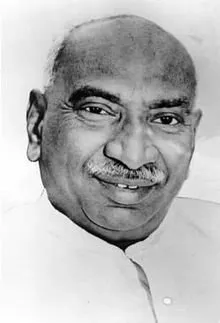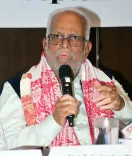How Did PM Modi Pay Tribute to K. Kamaraj?

Synopsis
Key Takeaways
- K. Kamaraj played a pivotal role in India's freedom struggle.
- He was the Chief Minister of Tamil Nadu from 1954 to 1963.
- Introduced the midday meal scheme for schoolchildren.
- His political strategies, including the Kamaraj Plan, shaped Congress leadership.
- Remembered as a champion of education and social justice.
Chennai, July 15 (NationPress) Prime Minister Narendra Modi honored K. Kamaraj, a highly esteemed political figure in India, on his birth anniversary, recognizing his crucial involvement in the freedom struggle and his lasting impact on post-Independence India.
In a statement shared on the social media platform X, the Prime Minister remarked, "Today, we pay tribute to Thiru K. Kamaraj Ji on his birth anniversary. He played a vital role in India’s freedom movement and provided exceptional leadership during the early years following Independence. His noble principles and commitment to social justice continue to inspire us all tremendously."
K. Kamaraj, affectionately referred to as the "Kingmaker" of Indian politics and recognized as the Kalvi Thanthai (Father of Education) in Tamil Nadu, was born on this day in 1903 in Virudhunagar.
A prominent member of the Indian National Congress, he became involved in the freedom struggle at a young age and was incarcerated multiple times by the British rulers. His quiet effectiveness, steadfast adherence to Gandhian principles, and connection with the grassroots made him a natural leader among the populace.
As the Chief Minister of Tamil Nadu from 1954 to 1963, Kamaraj implemented significant reforms in education and social welfare. His administration initiated the now-famous midday meal scheme in schools, established thousands of new educational institutions, and made education accessible to millions, especially from underprivileged and marginalized communities.
His emphasis on rural development and infrastructure set the groundwork for the state's subsequent industrial and social advancements.
Upon stepping down as Chief Minister, Kamaraj took on a significant role in national politics. In 1963, he introduced the "Kamaraj Plan", encouraging senior Congress leaders to resign from government roles to revitalize the party.
Although contentious, this proposal was embraced by several key leaders, including Kamaraj himself.
Later, he was instrumental in selecting Lal Bahadur Shastri and Indira Gandhi as Prime Ministers, earning him the moniker "Kingmaker".
Kamaraj remained an influential figure in the Congress party until his passing in 1975. His political legacy continues to motivate generations, especially in Tamil Nadu, where he is revered not only as a leader but as a statesman devoted to the welfare of the impoverished, education, and national unity.









